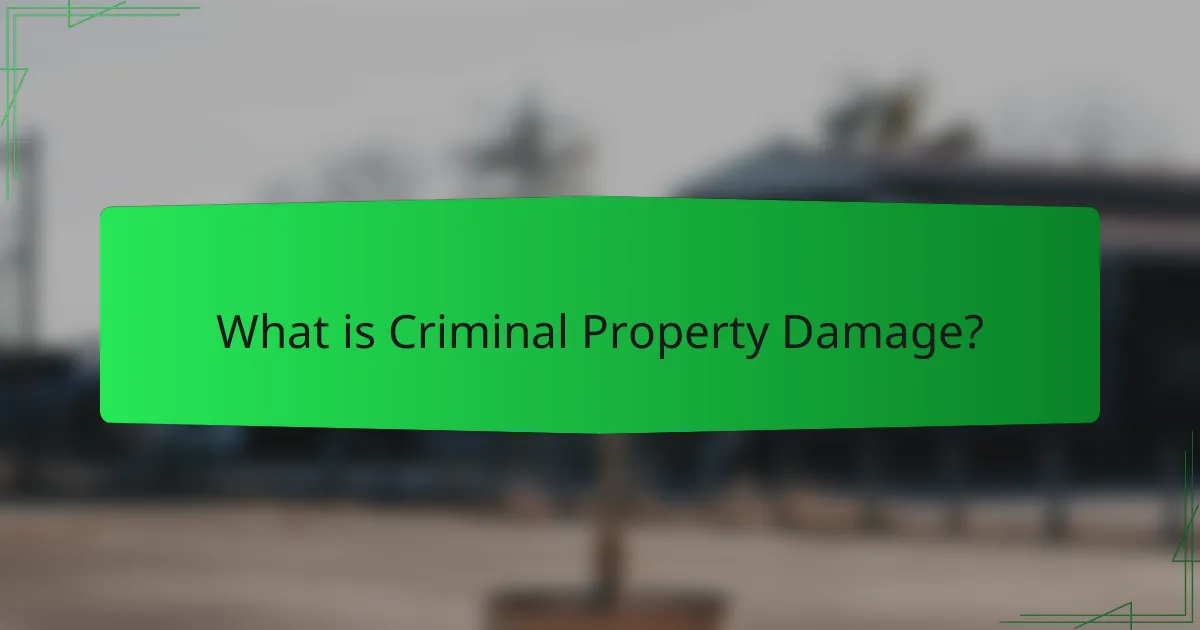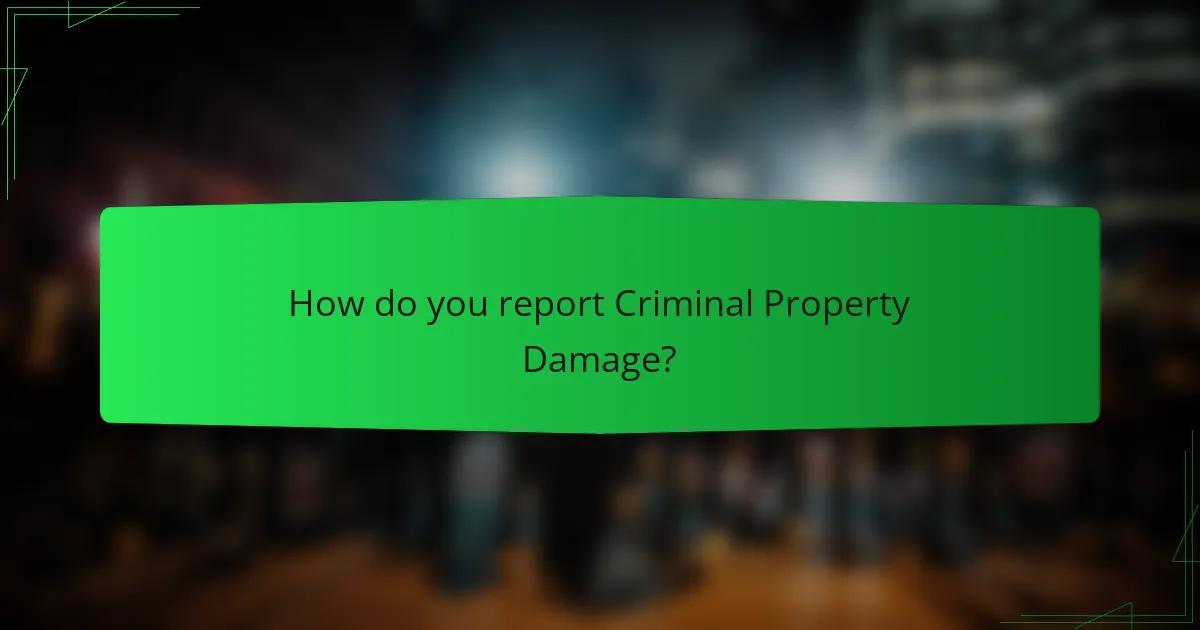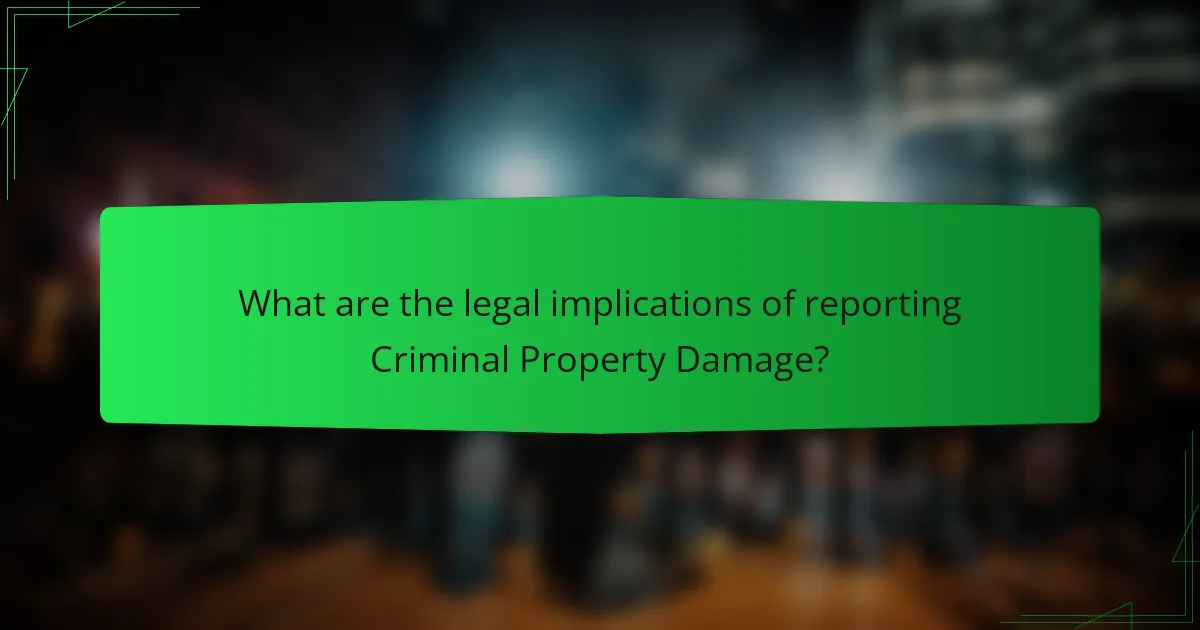Criminal property damage involves the intentional destruction or alteration of another person’s property, encompassing acts such as vandalism and graffiti. This offense is classified as a criminal act and can lead to both criminal charges and civil liability, with penalties varying based on the damage’s extent and intent. Reporting such damage requires contacting local law enforcement and providing detailed evidence, which is crucial for investigations and potential insurance claims. Failure to report accurately can result in legal consequences, and in some jurisdictions, reporting is mandatory. Understanding the reporting process and its implications is essential for individuals affected by criminal property damage.

What is Criminal Property Damage?
Criminal property damage refers to the intentional destruction or alteration of someone else’s property. This act can include vandalism, graffiti, or breaking windows. The law classifies criminal property damage as a criminal offense. It can result in civil liability as well. The severity of the offense often depends on the extent of the damage and the intent behind the act. Many jurisdictions impose penalties for criminal property damage, including fines and imprisonment. For example, in many states, causing damage exceeding a certain dollar amount can escalate the charge to a felony.
How is Criminal Property Damage defined legally?
Criminal property damage is legally defined as the intentional destruction or alteration of another person’s property. This includes actions that cause physical harm or significant impairment to the property’s value. Many jurisdictions classify this offense based on the extent of damage and the intent of the perpetrator. For example, damage can range from minor vandalism to complete destruction. Legal definitions often specify penalties based on the estimated cost of repairs or replacement. Additionally, laws may differentiate between misdemeanor and felony charges depending on the severity of the damage. This classification is crucial for determining appropriate legal consequences.
What are the different types of Criminal Property Damage?
Criminal property damage includes several types. Common categories are vandalism, destruction of property, and graffiti. Vandalism involves intentional damage to another person’s property. Destruction of property refers to the complete ruin of an asset. Graffiti signifies unauthorized markings on surfaces. Each type can lead to legal consequences. The severity of penalties often correlates with the extent of damage. Understanding these types aids in reporting and legal actions.
How does Criminal Property Damage differ from other property crimes?
Criminal Property Damage is distinct from other property crimes primarily due to its focus on intentional harm to another person’s property. This crime involves willful destruction or defacement of property, unlike theft, which involves taking someone else’s property with the intent to permanently deprive them of it. Criminal Property Damage can include acts like vandalism or graffiti, which do not necessarily involve taking the property away. In many jurisdictions, the penalties for Criminal Property Damage can vary significantly based on the extent of the damage caused. For example, damages exceeding a certain monetary threshold can elevate the crime from a misdemeanor to a felony. This differentiation is crucial in legal contexts, as it influences the severity of charges and potential penalties faced by the offender.
Why is it important to report Criminal Property Damage?
Reporting criminal property damage is crucial for several reasons. It helps law enforcement track crime trends and patterns. Accurate reporting aids in resource allocation for police departments. Timely reports can increase the chances of recovering stolen or damaged property. Documentation of the incident is essential for insurance claims. Insurance companies often require a police report to process claims. Reporting also serves as a deterrent to future criminal activity. Communities benefit from increased awareness and preventive measures when incidents are reported.
What are the potential consequences of not reporting?
Failing to report criminal property damage can lead to significant legal and financial consequences. Victims may miss out on insurance coverage that requires timely reporting of incidents. Additionally, not reporting can hinder law enforcement investigations, making it harder to hold perpetrators accountable. This lack of accountability can result in repeated offenses against the victim or others. Furthermore, victims may face challenges in proving their claims if they do not have an official report. In some jurisdictions, there may be legal obligations to report certain types of damage. Not adhering to these obligations can lead to fines or other legal repercussions. Overall, the consequences of not reporting can severely impact a victim’s ability to recover losses and seek justice.
How does reporting contribute to community safety?
Reporting contributes to community safety by enabling law enforcement to respond effectively to incidents. When community members report crimes or suspicious activities, it provides valuable information. This information helps authorities to identify patterns and hotspots of criminal activity. Increased reporting leads to a faster response time from police, which can deter crime. Furthermore, reported incidents can lead to community awareness and preventive measures. Studies show that communities with higher reporting rates experience lower crime rates. For example, the FBI’s Uniform Crime Reporting Program indicates that active reporting leads to more effective policing strategies. Overall, reporting fosters a safer environment by promoting vigilance and cooperation among residents and law enforcement.

How do you report Criminal Property Damage?
To report criminal property damage, contact your local law enforcement agency. Provide them with details of the incident, including the location, time, and nature of the damage. Gather any evidence, such as photographs or witness statements, to support your claim. File a report with the police, which may be necessary for insurance claims. Ensure you receive a copy of the report for your records. Reporting promptly can help in the investigation and recovery process.
What steps should you take immediately after discovering damage?
Immediately after discovering damage, you should assess the situation and ensure safety. Check for any hazards that may pose a risk to you or others. Document the damage thoroughly with photographs and notes. Gather information about the incident, including time, date, and any witnesses. Contact law enforcement if the damage is criminal in nature. File a police report to create an official record. Notify your insurance company to begin the claims process. Keep copies of all documentation for future reference. These steps help protect your interests and facilitate potential recovery.
How do you document the damage effectively?
To document the damage effectively, take clear photographs of the affected areas. Ensure that the images capture different angles and details of the damage. Write a detailed description of the damage, including the date and time it occurred. Create a list of damaged items with their estimated values. Collect any relevant witness statements if available. Preserve any physical evidence related to the damage. Report the damage to the authorities and obtain a copy of the police report. This documentation will support your claim for insurance or legal purposes.
What information should you gather before reporting?
Gather specific details about the incident before reporting. This includes the date and time of the damage. Document the location where the damage occurred. Take note of the type and extent of the damage. Collect information about any witnesses present at the scene. Record descriptions of any suspects involved, if applicable. Ensure you have photographs of the damage for evidence. Gather any relevant documents, such as insurance information. This information supports your report and aids in the investigation process.
Which authorities should you notify?
You should notify local law enforcement authorities. This includes the police department in your area. They are responsible for investigating criminal property damage. Additionally, you may need to inform your insurance company. Insurance companies require notification for claims related to property damage. If the damage is extensive, local government agencies may also need to be notified. This can include city or county offices that handle property assessments. Always document your notifications for future reference.
How do you contact local law enforcement?
To contact local law enforcement, dial the emergency number, usually 911. This number connects you to police services for urgent situations. For non-emergencies, use the local police department’s non-emergency number. You can find this number on the department’s official website. Additionally, you may visit the police station in person to report issues. Law enforcement agencies often have dedicated hotlines for specific concerns, such as crime tips or community safety. Always provide clear details about the situation when contacting them. This ensures a quick and effective response.
What role do insurance companies play in the reporting process?
Insurance companies facilitate the reporting process by collecting and assessing claims related to property damage. They require policyholders to report incidents promptly to initiate the claims process. Insurance companies review the details provided in the report to determine coverage eligibility. They may also investigate the claim by gathering additional evidence or documentation. This process ensures that claims are processed fairly and efficiently. Moreover, insurance companies provide guidance on necessary steps to take after reporting damage. They also inform policyholders about their rights and responsibilities during the claims process. Accurate reporting is essential for the insurance company to process claims effectively and in accordance with policy terms.

What are the legal implications of reporting Criminal Property Damage?
Reporting criminal property damage can lead to legal consequences for both the reporter and the perpetrator. When an individual reports property damage, they may be required to provide evidence to law enforcement. This evidence can include photographs, witness statements, or video footage. Failure to report accurately can result in legal repercussions for the reporter, such as charges of false reporting.
The perpetrator of the damage may face criminal charges, including vandalism or destruction of property. These charges can lead to fines, restitution, or imprisonment, depending on the severity of the damage. Reporting also triggers an investigation, which may involve law enforcement interviewing the reporter and witnesses.
In some jurisdictions, reporting property damage is a legal obligation, especially for specific types of damage, such as that involving vehicles or businesses. Failure to report can result in penalties or loss of insurance coverage. Overall, reporting criminal property damage is a critical step in the legal process that can have significant implications for all parties involved.
What are your rights as a property owner when reporting damage?
As a property owner, you have the right to report damage to law enforcement and insurance companies. This includes the right to provide evidence and documentation of the damage. You can request that authorities investigate the incident. Property owners also have the right to receive updates on the status of their report. Additionally, you can seek compensation through your insurance policy if applicable. It’s important to know that you are protected under laws that prevent retaliation for reporting damage. These rights are often outlined in local property laws and insurance policies.
How can you protect yourself legally during the reporting process?
To protect yourself legally during the reporting process, document all interactions and communications related to the incident. Keep a detailed record of dates, times, and the individuals involved. Obtain copies of any reports you file, including police reports or insurance claims. Consult with a legal professional to understand your rights and obligations. Ensure that you do not make false statements, as this can lead to legal repercussions. Familiarize yourself with local laws regarding reporting requirements. This approach helps safeguard your legal standing throughout the process.
What are the potential legal outcomes of filing a report?
Filing a report can lead to various legal outcomes. These outcomes may include criminal charges against the perpetrator. Law enforcement may investigate the claim, gathering evidence and witness statements. If sufficient evidence is found, prosecution may occur. Victims may also seek restitution for damages through civil court. Additionally, reports can lead to protective orders in cases of ongoing threats. The outcome often depends on the jurisdiction and specifics of the case. Statistics show that reports can significantly increase the likelihood of legal action being taken.
What should you do if your report is not taken seriously?
Document your report and gather evidence. Keep a detailed record of what you reported. Include dates, times, and descriptions of incidents. If your report is dismissed, escalate the issue to a supervisor or higher authority. Present your documented evidence to support your claims. Consider contacting law enforcement if criminal activity is involved. They may take further action based on your evidence. If necessary, seek legal advice to understand your rights. Legal professionals can provide guidance specific to your situation.
How can you escalate your complaint effectively?
To escalate your complaint effectively, start by gathering all relevant documentation. This includes receipts, photos, and any previous correspondence. Next, contact the organization’s customer service to express your dissatisfaction clearly. Be concise and state your desired resolution. If the issue remains unresolved, request to speak with a supervisor or a higher authority. Document this interaction, including names and dates. If necessary, follow up in writing, reiterating your complaint and previous attempts to resolve it. Consider involving external bodies, such as consumer protection agencies, if the matter persists. Research shows that structured escalation increases the likelihood of resolution by 60%.
What best practices should you follow when reporting Criminal Property Damage?
When reporting criminal property damage, document the incident thoroughly. Take clear photographs of the damage. Gather witness statements if possible. Report the incident to local law enforcement promptly. Provide a detailed account of the events to the police. Ensure you obtain a copy of the police report for your records. Notify your insurance company about the damage as soon as possible. Keep records of all communications related to the claim.
Criminal property damage involves the intentional destruction or alteration of another person’s property, including acts like vandalism and graffiti. This article provides a comprehensive guide on how to report such incidents, detailing the legal definitions, types of damage, and the importance of timely reporting. It outlines the steps to document damage, the necessary information to gather before contacting authorities, and the role of insurance companies in the reporting process. Additionally, the article discusses the legal implications of reporting, the rights of property owners, and best practices for effective reporting to ensure accountability and community safety.